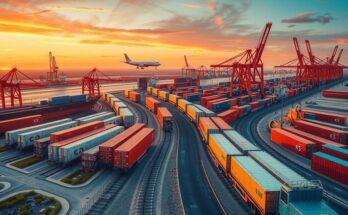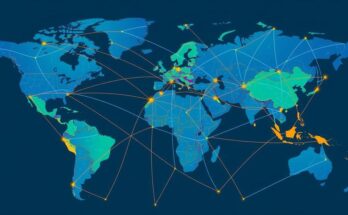The uncertainty of mass deportation looms over the American economy since President Trump labelled undocumented immigrants as a threat to national security. His executive order on the first day of his presidency aimed to remove all illegal aliens, leading to significant shifts within the work sector. As the Biden administration faced influxes of undocumented migrants, Trump’s government touted strict immigration policies, terminating protections for refugees and vulnerable populations from specific countries.
Economists like Benjamin Powell argue that immigration generally benefits the American economy by generating additional income and job opportunities through the interactions between immigrants and native-born Americans. Despite concerns that the influx of lower-skilled immigrants might suppress wages among non-college degree holders, Powell insists that an expanding workforce ultimately creates more jobs. He contends that a growing labour force fuels demand for goods and services, demonstrating that immigration can stimulate economic growth.
In the construction sector, employer Stan Marek highlights the struggles of hiring immigrants due to the uncertainty of their legal status. Although E-Verify exists to authenticate employees, many businesses hesitate to implement it due to concerns regarding its reliability and the potential for hiring delays. Marek states that employers often remain unaware of the legal standing of long-time workers, raising issues about the extensive use of fake IDs and fraudulent Social Security numbers within hiring practices.
On the other side, critics of illegal immigration argue that such individuals burden the welfare system. Powell counters, asserting that the problems arise from welfare policies rather than immigration itself. He suggests that effective fiscal changes can mitigate local burdens linked to some migrants. Furthermore, estimates indicate that deporting immigrants may actually cost taxpayers more, as decreased immigration can harm gross domestic product growth.
Different sectors will experience disparate effects from deportation policies. For instance, agricultural businesses may struggle without access to their traditional workforce, while some families may face increased difficulty in finding household help. Powell asserts that claims about negative impacts on average Americans overlook the real ramifications for families directly affected by deportations.
Legal immigration finds its advocates, but many argue that potential workers encounter insurmountable barriers in the process, making illegal routes more attractive. While some economists emphasise the importance of the rule of law, they recognise the potential economic harm in uprooting productive workers. Charles Steele argues that deporting individuals classified as “takers” might lessen the burden on taxpayers while asserting that economic implications shouldn’t overshadow lawful behaviour.
Immigrants often adapt, embodying cherished American values. Powell refutes fears of immigrants adopting undesirable political ideologies, citing Cuban Americans as evidence of immigration fostering pro-freedom sentiments. Yet recent policies to terminate legal protections for certain groups are seen as detrimental to ongoing migration debates. Powell warns that denying legal status to those escaping oppressive regimes contradicts the ideals America embraces, potentially creating thousands of illegal immigrants out of people fortunate to have previously held legal status.
The article explores the potential economic impacts of mass deportation, initiated under Trump’s presidency, including its effects on businesses and the labor market. Economists argue that immigration typically benefits the economy by generating jobs and income. However, deportation policies may lead to economic drawbacks, resulting in reduced GDP growth and sectoral challenges. The need for legal immigration pathways remains crucial, and the implications of these policies continue to fuel ongoing debates.
In conclusion, the economics of mass deportation present a complex tapestry, woven through the interactions between immigration, legal frameworks, and economic outcomes. While some argue for the rule of law, the broader implications on employment, economic productivity, and the well-being of communities remain pivotal. As the debate continues, understanding the nuanced effects of these policies is essential for shaping a balanced perspective on immigration and its economic consequences.
Original Source: wng.org



